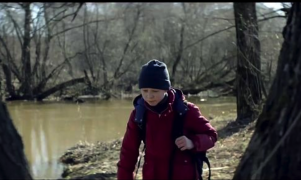London Film Festival Review: Loveless – “A haunting, difficult watch”
“On with the song,” says a character in Loveless, inexplicably aiming for levity but failing to land, as he stumbles through a tragedy. And make no mistake, Loveless is a tragedy about the failure of people, of systems and of the State.
Loveless begins in Autumn 2012 in Moscow, following young teenage Alexey at the end of his school day. If solemn, at first, Alexey seems carefree, walking through a wood and playing with some police tape. But when he arrives home, it is clear that home is not a sanctuary. Alexey later hears an argument between his embittered divorcing parents, Zhenya and Boris, who are at a stalemate, neither willing to take custody of Alexey. This argument triggers Alexey’s disappearance, which neither parent notices at first, both wrapped up in other partners, Zhenya with an older, rich man and Boris with a younger girlfriend, whose imminent pregnancy is the cause of his marriage breakdown.
What follows is at first glance, a police procedural. The Russian system is so overloaded that Zhenya and Boris must use a volunteer group to help find their son. Loveless focuses on their painstaking search, Alexey always in our thoughts but perpetually out of reach.
This is -a- story of Loveless, but not -the- story; director Andrey Zvyagintsev (Oscar winner for Leviathan) never tells only one story. He peppers the narrative with background media propaganda on the apparent suffering of people in Ukraine, the type of reporting which may have led to Russia’s military invasion in 2014. A less subtle reference has Zhenya taking to the treadmill wearing Russian Olympic team sports kit.
 There are jokes and drama arising from Boris’s working life, as his extremely religious employer does not tolerate divorce. And there is much judgment of the modern Russian bourgeoisie, their obsession with selfies and mobile phones, and the prevailing need for beauty even with pain (including introducing some clever camera work as Zhenya is intimately waxed).
There are jokes and drama arising from Boris’s working life, as his extremely religious employer does not tolerate divorce. And there is much judgment of the modern Russian bourgeoisie, their obsession with selfies and mobile phones, and the prevailing need for beauty even with pain (including introducing some clever camera work as Zhenya is intimately waxed).
Zvyagintsev plays with expectation but refuses to play the blame game, making us believe that Boris and Zhenya are the bad guys until the viewer is faced with Zhenya’s frightful mother, who barricades herself in a house – another clear metaphor. Then there are the natural scenes of sex between consenting partners, which are quickly compared to myriad examples of parental neglect.
Maryana Spivak and Aleksey Rozin as Zhenya and Boris do extremely well with the difficult material, and Matvey Novikov as Alexsey could be a real talent, watching him cry was so very painful. However, Loveless is the director’s movie.
As simply a study of parenthood in a greedy yet puritanical culture, Loveless is a masterwork, but as an indictment on society and an allegory for the mistreatment of Ukraine, it is astounding. Bad parenting can also apply to Mother Russia, it seems.
This is a haunting, difficult watch, serving as a morality play, even with Zvyagintsev’s trade-mark ambiguity. Loveless asks us not to go on with the song, but instead to wake up, take responsibility and change the tune.










